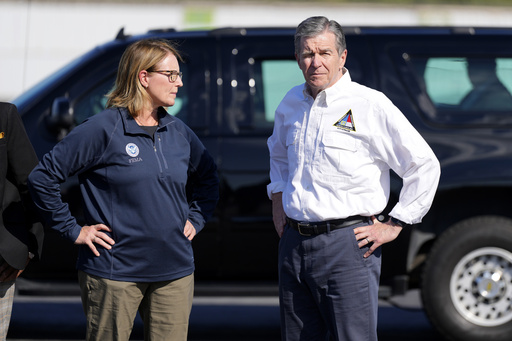RALEIGH, N.C. — On Thursday, North Carolina’s Governor Roy Cooper enacted the state’s initial relief package in response to the destruction caused by Hurricane Helene, designating $273 million for urgent needs and providing agencies and affected residents with necessary flexibility.
The Democrat’s signature followed a unanimous approval from the Republican-controlled General Assembly the previous day. A significant portion of the allocated funds will cover the state’s share required to access federal disaster assistance programs for state and local levels. Additional funds will ensure that nutrition staff at closed public schools receive their pay, as well as support efforts to manage elections in the upcoming weeks within this critical battleground state.
“This legislation represents a vital first step towards recovery for Western North Carolina, which will require exceptional support from both state and federal entities,” Cooper stated in a news release. The legislature also agreed to reconvene in Raleigh on October 24 to discuss further recovery measures.
The $273 million included in the recent legislation draws from the state’s savings reserve, which totals $4.75 billion. Moreover, the new law eliminates fees for residents in western counties needing to replace lost driver’s licenses and identification cards, along with easing permitting requirements for specific highway repairs and the open burning of storm debris.
The General Assembly broadened election rule changes approved earlier by the State Board of Elections for 13 counties severely impacted by the storm, now extending the modifications to 25 counties that house roughly 1.3 million registered voters. These counties fall under the federal disaster declaration.
Election officials are currently assessing the damage at approximately 540 polling places for Election Day in the affected region. State Board of Elections Executive Director Karen Brinson Bell informed reporters on Thursday that some polling locations might need to be relocated to tents, trailers, or motor coaches.
According to the new regulations, voters residing in the 25 impacted counties can now apply for an absentee ballot in person at their local election office up until the day preceding Election Day, allowing them extra time to access their ballots.
Additionally, the new legislation has revised the options available for displaced residents in the area for submitting absentee ballots. Voters within these counties are now permitted to return their absentee ballots at any operational early voting location or county election office throughout the state, as well as at the State Board of Elections office in Raleigh.
However, the legislation has curtailed an option earlier approved by the state board that would have allowed voters to drop off absentee ballots at polling places within their home county on Election Day, as stated by board attorney Paul Cox on Thursday.
The first wave of absentee ballots was mailed to those who had requested them shortly before the impending arrival of Hurricane Helene, raising concerns that floodwaters might have destroyed some ballots. Disruptions in mail services may also necessitate in-person requests and returns.
The Friday deadline for statewide voter registration for both mail-in votes and in-person voting remains unchanged, although voters can now also register and cast their ballots at early voting sites from October 17 to November 2.
Brinson Bell reported that 75 out of the 80 early voting locations in the 25 affected counties would be operational next week; however, some sites still require portable restrooms, generators, and internet access.
Having lived in the mountainous region for two decades, Brinson Bell emphasized that the state has successfully managed elections in the aftermath of previous natural disasters as well as during the COVID-19 pandemic.
“Conducting this election amid such devastation is undoubtedly more challenging. Nevertheless, our established processes are effective, and we are applying our knowledge to ensure that voting is accessible to all North Carolinians,” she stated.
